#good omens fan theory
Text
Heartache
Since I put up my theories that Crowley and Aziraphale faked the break up in the Final Fifteen, I've had a LOT of people comment, "Then why are they so sad?"
LISTEN.
Imagine you and the person you love most in the world have to keep your relationship secret. Because no one would approve of it, and one or the other of you could be hurt or killed or imprisoned over it. So you keep it casual, and have to pretend you're not even friends.
Then you get a chance to change everything. You get a chance to save the world, and maybe have that relationship you both want so badly together. You even plan your proposal. You throw a big party and make it as romantic as you know how.
Then your party gets crashed by people who hate you.
And then an authority -- one that has the power to make both your lives horrible and maybe end them -- comes sniffing around. He's figured out you're up to something, and that you've teamed up, and been teamed up for a while. He maybe suspects you're more than friends, when even friends is something you are not allowed to be. He essentially black mails you into coming back with him, to what essentially amounts to prison, though he offers that your love can come with you. You'll both be in prison, and maybe not be able to save the world, but you'll be together, and safe.
You tell the person you love most in the world what's going on, that your plan has been uncovered, and beg him to come with so he will be safe. And your beloved says, "No, I'm not going, I want to fight for this. I want to fight for you, and for us. I want to save the world. We need to pretend to break up so I can keep working on our plan. You do what you can from inside prison, and I'll do my best from here, and let's try for this. For us." And then he breaks your heart and forces you to reject him. While your enemy watches and waits to take you to prison. And he doesn't let you leave without kissing you first. He gives you something while he kisses you that he hopes will help you. And then he goes.
Imagine your beloved tells you an authority has come sniffing around -- he suspects you're up to something and wants to haul you both to prison. Your beloved has no choice, he absolutely is going to prison, right now, but he wants you to come with him. You want to fight, you want to be free with your beloved and you want to save the world. So you tell him you have to fake a break up in order that one of you can stay free and hopefully make it work. And then you break his heart, and force him to reject you, while your enemy watches and waits to take him to prison. And you do not let him leave without kissing him first. You give him something while you kiss him that you hope will help him. And then you leave.
If you could do that while feeling nothing, totally confident that you're still a couple and everything is actually fine, you've got a different head than me. I wouldn't be okay, watching my husband get taken to prison for the crime of being in love with me. I certainly wouldn't be okay pretending not to care, or like we never meant much to each other after all.
The break up is fake. That doesn't mean any of those emotions are.
It actually makes it worse, in my opinion.
If Aziraphale had actually chosen Heaven over Crowley, Aziraphale would be sad, but not miserable. But he hasn't. He's going to prison without the one person he most wants to protect and be with. And he has no guarantee that Crowley will be safe, or that they will ever see each other again. He must be devastated.
If Aziraphale had chosen Heaven over Crowley, Crowley would have every right to be hurt and angry. But Aziraphale hasn't. He's being dragged to prison, where Crowley can't be with him and make sure he's okay, where Crowley knows he'll be treated badly, and Crowley's going to try to save the world, and if he succeeds, they can build that life together they've wanted for so long; but if he fails, they may never see each other again. He must be devastated.
Stop asking why they both look so sad if the break up is fake.
They are devastated.
#good omens#good omens 2#crowley#aziraphale#good omens meta#ineffable husbands#aziracrow#good omens analysis#good omens fan theory#the final fifteen#ineffable divorce#final fifteen#our poor husbands#it's so much more sad than it first seems
62 notes
·
View notes
Text
Finished Re-Reading Good Omens

I've finally finished re-reading the Good Omens book. I prefer to read books as ebooks, so I did. I use Kindle in particular.
On the last spread, whether through the web browser or the app on my PC, there are three instances of the word "pocket" (two versions in plural form). Rule of Three. Pockets!!!
There's a chapter break, then the overall ending paragraphs that have eight instances of the word "imagine".
I double-checked my paperback copy out of curiosity. I confess I bought this paperback copy because...David Tennant's on the cover. But it's convenient to have a more readily tangible version of the book to check this stuff.
So, in the paperback copy, those three instances of the word "pocket" are on the last numbered page for the contents of the story itself.
The section that uses the word "imagine" eight times is on the next page and not numbered.
...
So, to anyone new around here or wants a general reminder of my theory stuff...
Earthly Objects is a large, difficult hidden game in Good Omens 2. It's a layered game the characters play, and then an audience member can play trying to figure out how the game works.
It has a Rule of Three. It has 6 Threshold Tricks (3 Simple, 3 Complex) as findable, solvable puzzles. Each one is special in its own way, but one in particular—The Pocket Trick—is a hidden giant with a giant impact on many things, including the other 5 Threshold Tricks.
The Threshold Tricks are very, very complicated but based on simple ideas I call "core concepts". That's part of the puzzles to solve.
The Pocket Trick's core concept is, "Think outside the pocket," because it requires using one's imagination with assorted word play to solve the puzzles within it.
Another of the 6 Threshold Tricks is The Sunglasses Trick. It has eight touches.
One of the interesting hidden messages for The Pocket Trick that I'm not sure I have properly down in the wording and never posted goes something like the following..."If you played far enough to find The Pocket Trick to begin with, you've been using your imagination with word play all along." It's a small comfort when dealing with The Pocket Trick's astronomical level of difficulty.
Anyway, the reason I bring up that message is because to solve The Sunglasses Trick—the one with eight touches—I had to imagine the sunglasses were a door to Crowley. The core concept I eventually named for it was, "Crowley's sunglasses are his door to himself." It was the next-to-last Threshold Trick I solved (in a broad sense).
While Crowley himself isn't actually in this last spread of the book since it's about Adam, there is mention of a "cobra" (a snake) in the following sentence, "With the speed of a striking cobra the boy was up the tree."
...
This reading hasn't really helped me solve things further in my desperate attempt to improve my play, but it does make me feel I'm on the right track and have been on the right track with the Earthly Objects game, the Threshold Tricks, and The Pocket Trick in particular.
...
I don't know if I'll have more to say later, but I really wanted to get something out of my system after seeing the word "pocket" used three times.
#crowley#good omens 2#good omens#good omens s2#david tennant#good omens season 2#good omens meta#good omens analysis#good omens crowley#crowley good omens#good omens theory#good omens theories#good omens fan theory#good omens clues
22 notes
·
View notes
Text
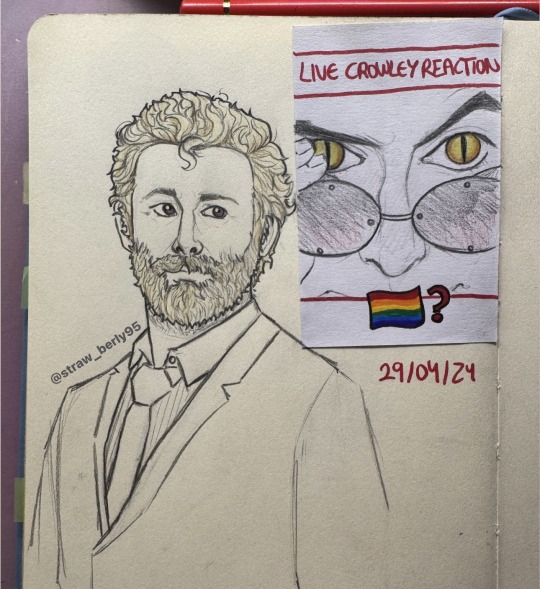
Aziraphale with a beard in s3 Neil.....PLEASE NEIL😫😮💨 (I didn't liked how Crowley turned out so....cursed Crowley it is(?))
#good omens#good omens aziraphale#good omens crowley#good omens art#crowley good omens#good omens au#good omens fandom#good omens fanart#crowley fanart#aziraphale good omens#aziraphale fanart#crowly x aziraphale#crowley x aziraphale#aziraphale x crowley#aziracrow#azirafell#aziraphale#aziraphale with a beard in s3 pls neil#anthony j crowley#crowley#good omens fanwork#good omens fan theory#good omens funny
29 notes
·
View notes
Text
CORRECTED & UPDATED! Clothes + Equivocation = Romance:
The Husbands in 1793
EDIT: I made a significant error when I wrote this. As @goodjomans kindly points out in the comments to Part 2 of this essay (massive shoutout for this, goodjomans! also I love your name!), Aziraphale is the one who dresses the executioner in clothing like Aziraphale's original ensemble, not Crowley. This changes my conclusions about the meaning we can take from this scene!
On the one hand, mea culpa, y'all. I shall get on with eating my crow. On the other hand, I had to go through this frame-by-frame to catch which of the ineffable spouses puts Jean-Claude in his new togs, and the answer only lasts three frames. Here it is:
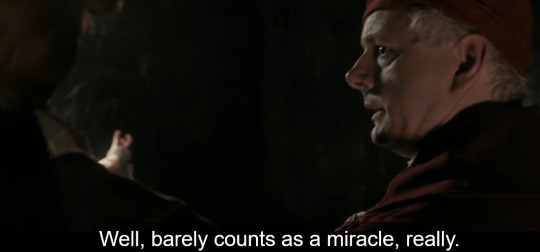
After Aziraphale changes his clothes, but before Crowley snaps his fingers and unfreezes time, there's a shot of the executioner over Crowley's shoulder, and he is now wearing a light coat with gold embroidery on the shoulders like Aziraphale's. Aziraphale arranges the executioner's death, not Crowley. So I feel like an idiot for missing it, but not a total idiot.
Let's discuss how this information changes what we can read from this scene! I'm going to leave my original text in place and edit with bold green. I can still stand by most of this essay, but this detail changes how I read the meaning of the husbands' communication at the end of this scene.
So we're all clear on the fact that the universe of Good Omens is an inescapable nightmare dystopia in which either of the husbands' merciless authoritarian regimes could be watching or listening to them at any time, yes? And that if either are caught 'fraternizing' with the other that means discorporation, torture, memory wipe, and/or death for either or both of them, yes?
Which means Crowley and Aziraphale can never speak or do anything openly to each other about their friendship or attraction or love. Everything they say and do has to have an innocuous meaning they can point to in case anybody ever sees or hears something Team Azcrow can't explain away. Walls (and ducks) have ears, and the price of slipping up--as we see in 1827--is heavy.
When a character says or does something that has two distinct meanings because they need to disguise what they really mean from one party but make their meaning plain to another, lit-nerds (and lit nerds🍃) call this equivocation. Equivocation is a kind of coded communication meant to pass hostile ears and eyes in plain sight but reach its intended recipient with its true meaning. The 1793 scene is jammed with it.
A lot of that coded messaging revolves around the clothes Crowley and Aziraphale choose in this scene, so--THESIS PARAGRAPH, BITCHES--we're going going to talk about how their clothes read to the people of this time period and location, what their clothes tell us about their characters, how their clothes help them equivocate, and what they're really saying with that equivocation. And Spoiler A-fucking-lert, it is ROMANTIC AF PRETTY GD ROMANTIC. Let's get nerdy!
We start with Aziraphale's beautiful champagne-gold and powder-pink ensemble.
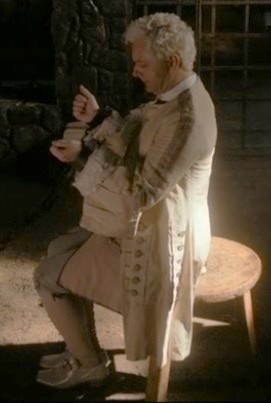
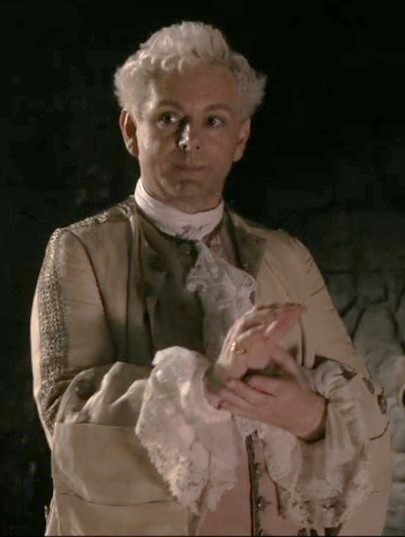
This outfit would tell people of this time period 3 things about Aziraphale:
That he's insanely wealthy--These clothes would be silk, hand-embroidered with thread made with actual gold. Each individual garment could cost years' or even decades' worth of working-class wages and take a team of skilled artisans dozens to hundreds of hours to make.
That he's a fop--i.e., a man who loves fine clothes and dressing up and looking fancy. By the 1790s in England, once-fashionable foppishness was giving way to the Neoclassical 'Corinthian' style, and was considered effete. (Fun note: During this time period, effete did not automatically indicate gay, and pink was considered a masculine color, so while Az. is queering it up to the audience here, his clothes would not have read as gay or overtly effeminate to the other characters around him.)
Even though he's insanely wealthy, Aziraphale wears clothes that are decades out of fashion.
According to the Victoria & Albert Museum, "As the [18th] century progressed, the male silhouette slowly changed.[...] Coat skirts gradually became less full and the front was cut in a curved line towards the back. Waistcoats became shorter. The upper leg began to show more and more[...]. Shoes became low-heeled with pointed toes and were fastened with a detachable buckle and straps or ribbon[.]
Source
That description is not what Aziraphale's wearing. Judging by his heel height and the length of his waistcoat, Aziraphale is wearing a style that's at least a decade older than this:
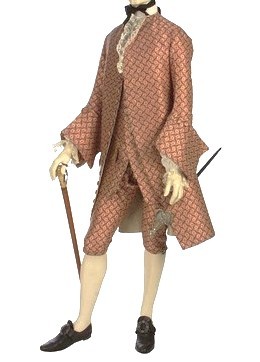
And this is from 1765. The great crepes caper happens in 1793, almost 30 years later.
My inference: Just as he has in the modern period, Aziraphale has settled into a style he really likes and refused to let go of it long after it's gone out of fashion.
We'll come back to this set of Aziraphale's clothes in a bit, but we need to talk about Crowley's first, because Crowley's clothes in this scene help render a line he says later about this outfit very flirtatious and darkly romantic.
First, some background: What was considered acceptable attire for wealthy people in France changed pretty much overnight during the French Revolution after the storming of the Bastille in 1789 and the fall of the French monarchy. Instead of advertising wealth, clothes now had to advertise political allegiance, and they had to do so loud and clear. And if you didn't want to be murdered by the French First Republic, that political allegiance had fucking better be to the Revolution.
People started wearing a looooooot of super patriotic shit. And I mean it was like little kids on the 4th of July; clothes were red, white, and blue in any hue and garish combination and print. The cockade, a fabric rosette in the colors of the French flag, was required by law to be worn by men, and despite that was just as popular among women. To show solidarity with the laboring classes, the fabrics the wealthy wore went from embroidered silk in light Rococo colors (what Aziraphale is wearing) to sober neutrals without decoration in wool, cotton, and linen.
Now, the script note for Crowley's clothing in this scene is this:

But clearly there were some changes made between script and filming, because Crowley does not appear standing behind Aziraphale; he appears lounging.
And he's not dressed as a French peasant.
Here's how French peasants dressed in 1790:
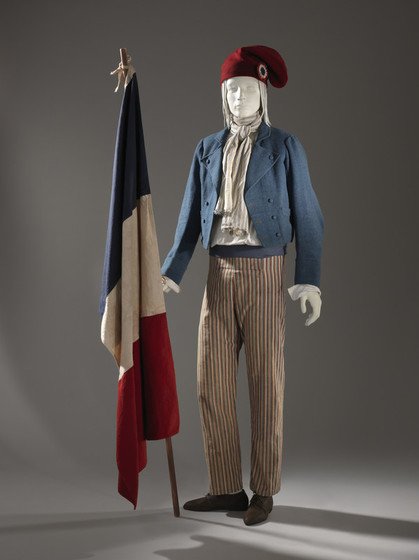
Peasants at this time wore styles that distinguished them from the styles of the upper classes not just in materials, colors, or patterns, but in shapes. Full trousers and cropped boxy jackets in French flag colors were the marks of the laboring-class Revolutionary, and both styles were huge changes from hundreds of years of French fashion up to that point.
And that's not what Crowley shows up wearing. Crowley is wearing the knee breeches, stockings, waistcoat, and frock coat of a wealthy man, and in fact his clothes reference a very specific type of wealthy man.
In the 1790s, if you were an aristocrat who wasn't happy about the Revolution and you were so sure of your privilege that you would risk your life showing it, you wore black in mourning for the monarchy and in protest of the violence of its deposition. If you were an aristocrat who wanted to protest and you didn't want to be immediately murdered by the French First Republic, you wore a style called half-mourning, which was black with a colored coat.
Here's a picture from a 1790 fashion magazine of an aristocrat in half-mourning:
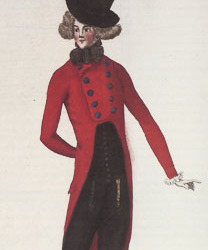
"The text accompanying the plate describes his ensemble as 'half-mourning,' referring to the aristocrats who lamented 'the diminished powers of the monarchy and [signaled] their willingness to die for the royal cause'" [emph. added]. [Source]
Notice: the shoes, stockings, breeches, waistcoat, and cravat are all black. You with me?
Because here's Crowley in 1793:
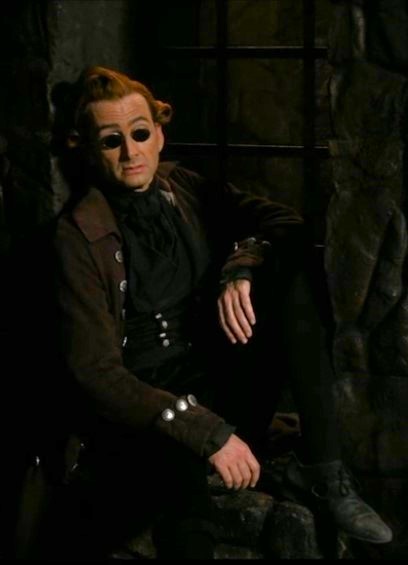
I've turned up the brightness and exposure in this image so he's more clearly visible against the stone, but I haven't warmed it up. He's wearing a coat that's a dark blackish red. Everything else, even his cravat, even his shirt, is black. (The black shirt is anachronistic, a lovely little nod to Crowley's refusal to wear angelic white.)
This is 179fuckin'3, y'all. Marie Antoinette is executed in 1793. It's 3 full years after that fashion plate up there in his bright red jacket, and that lil dude was already risking his neck way back in 1790. As we can see from the fact that the government are apparently now grabbing random wealthy-looking Englishmen off the street to murder without trial, the time for a man demon to be sauntering around Paris dressed in all black or even nearly all black is well past.
Crowley's also wearing a whole assload of huge silver buttons, which would have been flashy and tacky and frankly pretty weird in 1793 but very definitely an eccentric Rich Person Thing to do, bc regular buttons at this time were horn or wood and covered with the garment's fabric. The only man in France who could get away with this fancy aristo shit anymore was Robespierre himself, and only "devotion to the cause[...] excused Robespierre’s showy dress since he was perceived as a bridge between the politically empowered bourgeois deputies and the ardently antimonarchical unenfranchised classes." [Source]
So when Crowley teases Aziraphale--
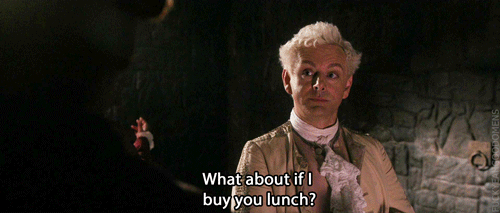
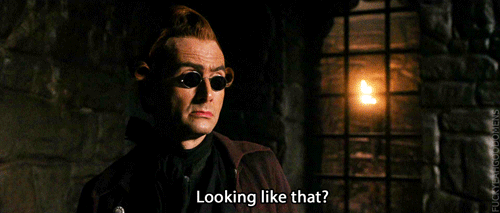
--both of them are perfectly well aware that Crowley's outfit would get him just as killed as Aziraphale's.
And that's why Aziraphale's expression is annoyed when he has abandon his "standards" and change his clothes. Because Aziraphale's the one who needs the favor, Crowley makes him take one for the team and wear the goofy hat.
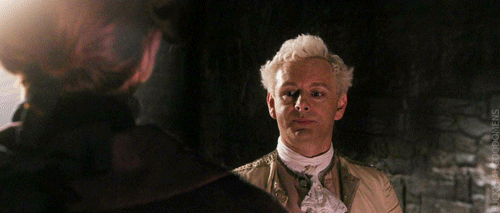
The clothes Az. changes into here still tell people that he's rich, but they also say he's a hardcore Revolutionary. The red jacket in a current cutaway style, the cockade and sash, and the bonnet phrygien (the red garden-gnome cap) all announce this guy is a huge supporter of the Revolution. His clothes are all still aristocratic in shape and materials (and he keeps his now-unfashionably frilly lace cravat), but he's no longer flaunting obscene wealth in a city filled with angry starving people, and the gnome cap says he's in solidarity with the working classes even if he isn't one of them.
Once he restarts time, Crowley is not leaving that prison cell safely without either changing his clothes or taking Aziraphale with him, because Crowley looks like a rich asshole protesting the fall of the monarchy--which is frankly exactly the kind of thing he'd show up wearing to the Bastille during the Reign of Terror (just like he wears athleisure in Heaven). But Aziraphale's new appearance covers for them both: if the rich-looking guy with no cockade and wearing all black under his almost-black coat is in with this other guy who's obviously a Revolution fanatic, then the rich guy's probably okay, right? He just forgot his sash at home or something. Bees.
Something else happens when Az. changes, too. Look at Aziraphale's new dress from a different angle:
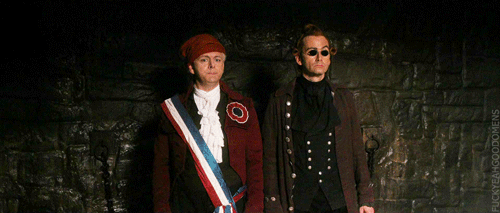
Half-mourning is a white shirt, but a black cravat, so this isn't half-mourning. He's wearing three different badges of the Revolution to make up for the fact that Crowley looks like a Satanic libertine (which tbf he is), but Aziraphale's new ensemble is black and dark red.
Y'all. Aziraphale changes into Crowley's colors.
Now, this is a more fashionable and higher quality version of what the executioner is wearing, so Aziraphale has very plausible deniability here; if anyone ever pulled him up on it, he could say he just copied our man Jean-Claude.
But let me show you what English fashion looks like right now:
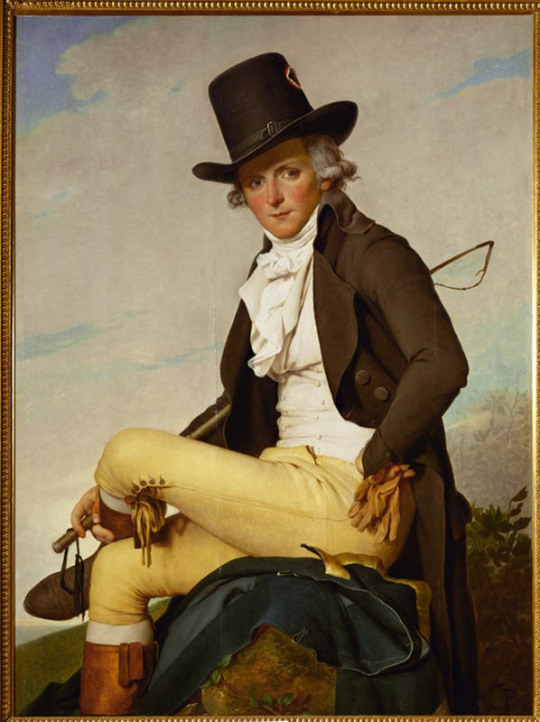
This is a French painting of a wealthy Frenchman, but he's wearing the English 'Corinthian' style. It was painted in 1795, so this would have been the very cutting edge of fashion in England in 1793, and the fabrics and colors look right at home in Revolutionary Paris. (He's wearing the cockade on his hat, btw.)
Look at all that angelic white! The buttery almond of the buckskin breeches, the golden kidskin gloves, the rich tan of the riding boots! The blue of the greatcoat! All colors we know Aziraphale prefers!
And yet this is what Aziraphale chooses:

We know from the entire rest of the show how very particular about his clothes Aziraphale is. And yet 150 years before he (accidentally) admits in words that he's Crowley's friend, Aziraphale wears Crowley's colors to take him to lunch to say thank you for a rescue.
When we decide whether a character's speech or action is equivocation, one of the things we check is whether equivocation (and deception generally) is something that character does elsewhere in the text, which, with Aziraphale, hahahahaha, DUH. He's already using equivocation in this scene.
The lunch date itself is equivocation on Aziraphale's part. Aziraphale tries to thank Crowley for the rescue, but Crowley says,
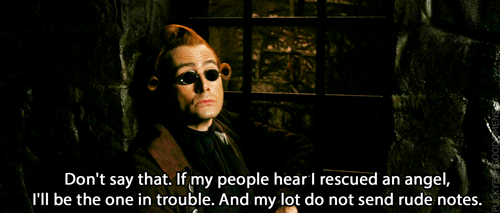
So Aziraphale says,

No more words like "thanks" or "rescue" used, but a couple hours of good food and drink and conversation, Aziraphale hopes, will express the gratitude toward Crowley it's not safe to speak aloud. With this, Crowley and Aziraphale explicitly establish that they are equivocating for each other's safety and using coded communication--immediately before Aziraphale changes into Crowley's colors.
So yes, Aziraphale may well copy the executioner's clothes. But consider: When a character who can't speak or act openly says or does something that has two or more possible meanings, this can be read as equivocation.
We don't get a face reaction from Crowley about Aziraphale's new 'fit, so we can't be sure how he feels about this. But this whole scene is, even on its surface, about 1) the meaning clothes transmit to a viewer ("Oh good Lord," says Aziraphale when he sees what Crowley's wearing) and 2) how to show gratitude and appreciation when you can't speak of them openly. And we know Crowley notices clothing and clothing colors, because look at what he wears, like, ever. So it's very reasonable to presume he notices Aziraphale wearing his colors, and it fits well with both the rest of Crowley's actions in this scene and with his being very hurt and angry when Aziraphale later characterizes their interactions as "fraternizing."
Right, so we've covered what's going on with the husbands' clothes, and we've looked at two examples of equivocation on Aziraphale's part, viz., lunch and his change of colors. (Here's an example of equivocation on Crowley's part as well.) Now let's look at that super interesting thing Crowley says about Aziraphale's first outfit.
Here's the line:
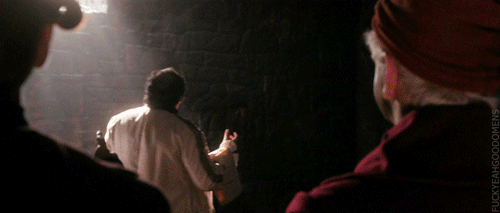
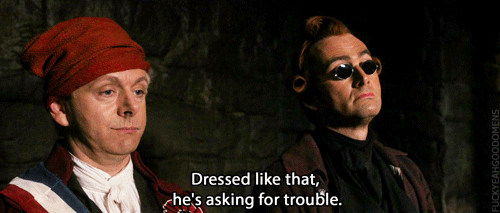
Crowley follows up here on earlier lines in which he teases Aziraphale for coming to Reign-of-Terror Paris for crepes: "Dressed like that?" meaning Aziraphale was guaranteed to get arrested dressed like an aristocrat. The top layer of equivocation is always an innocuous meaning: the plausible deniability meant for the hostile/unsafe listeners. That's Meaning 1.
But "Dressed like that, s/he's asking for trouble" means two other things, too. It's a veeerrrrry familiar phrase, isn't it? We've all heard that arrangement of words in that order before. It's used when people think someone (usually but not always a woman) is dressed to invite sexual attention.
How do we know we're supposed to take this modern meaning from this phrase? This is how:

We have learned in literally the previous sentence to this one that rain has not been invented yet. The only two humans in existence have just left the Garden. Balloons definitely do not exist yet, humans couldn't tell you what lead is, and yet this is a phrase Crowley uses and Aziraphale understands. This tells us, the audience, in the very first line of the very first scene with these characters, that their speech is anachronistic and modern, and that we are to understand their phrasing in its contemporary sense.
So. When Crowley says "Dressed like that, he was asking for trouble" in 1793, we should read that in the context of the scene and in the senses the phrase carries to us today.
And since Crowley is using a phrase that means the executioner is dressed to invite sexual attention, and the executioner is wearing clothes identical to Aziraphale's, then Crowley is necessarily telling Aziraphale that when Aziraphale was wearing those clothes--those frilly, effete, unfashionable-for-decades clothes that nobody else likes and the French now murder people for wearing--that was, in Crowley's view...provocatively sexy. Meaning 2.
"Dressed like that, s/he was asking for trouble" is also what people say to justify violence, especially sexual violence against women and queerphobic attacks against men perceived as gay or just 'insufficiently' 'masculine'. In fact justifying assault is likely the most common way this phrase is used today by a wide margin. Meaning 3.
Crowley's joke isn't even really a joke in this sense; it's a vicious barb. And, because it must, it sounds like it's at Aziraphale's expense: You wore the wrong clothes, you weren't careful enough to guard yourself against the men who want to do you harm, so you deserved the trouble you got. Meaning 1.
Except remember: Crowley is also dressed for trouble. And Aziraphale is aware of this. Crowley's 'fit would be almost as offensive to the Revolutionary French of 1793 as Aziraphale's Rococo pastels, and probably just as likely to get him arrested and murdered by the state if he weren't making letting Aziraphale keep him safe by wearing the cockade and the silly hat. Crowley's not saying anything about Aziraphale here that he's not also saying about himself; and as we know from Aziraphale's initial "Oh good Lord" when he turns around and sees Crowley's black and red half-mourning (with extra black and gobs of silver), Aziraphale knows it.
Then why the rapey joke, Crowley?
This is fucking why:
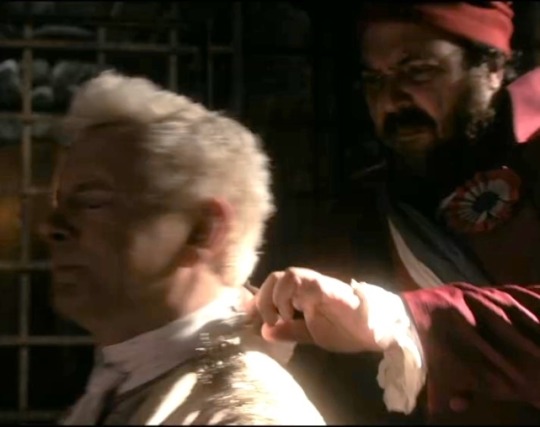
Crowley rocks up at the Bastille just in time to witness some grubby fucker assault his friend. Assault the person Crowley will greet 15 seconds after this as angel.
Crowley's first act after freeing Aziraphale is to send this dude to his death. Nope! Aziraphale is the one who arranges to have the executioner killed in the clothes he would have killed Aziraphale for wearing. He takes Jean-Claude's ability to speak (but not to make sounds, interestingly! Jean-Claude can still whimper, Jean-Claude can still cry!) so the executioner can't tell anyone about the 'mixup.' It's unclear which of them blocks the executioner's power of speech. The vicious joke about assault in Meaning 3 isn't at Aziraphale's expense at all. It's not You wore the wrong clothes, so you deserved the trouble you got. It's If this guy thinks you deserve trouble for wearing the wrong clothes, he can eat his own rules.
And that's the other piece of evidence that, along with Crowley's ensemble, shows us the audience and Aziraphale which meanings Crowley intends with his equivocation. Meaning 1 is cancelled out by Crowley's clothes. That leaves Meanings 2 and 3.
Crowley and Aziraphale share clothes as a common interest. They don't have the same style, but they're both aware of current fashions, and Heaven and Hell aren't. You can't tell me Hastur or Uriel would recognize the significance of Crowley saying "Dressed like that, he's asking for trouble" about someone else while wearing black stockings and cravat and waistcoat himself. And that means Anything the husbands communicate to each other through clothing choices goes undetected by their masters.
SO. With all this in mind, let's go through the 1793 scene again and look at what their clothes help them say without words.
Concluded in Part 2!
#good omens#good omens 2#good omens s2#good omens costumes#good omens fan theory#good omens meta#good omens analysis#aziracrow#azcrow#ineffable husbands#aziraphale x crowley#azicrow#good omens 1793#good omens 1984#good omens clothes and equivocation
548 notes
·
View notes
Text
A Theory?
I had a strange thought as I was watching Good Omens for the 1,462nd time.
In A Companion to Owls, there are a lot of crossover references. For instance….

When God is speaking to Job, Crowley indicates to Aziraphale that just being able to ask a question of God, even if they don’t answer, is something he’d want.
In S1, we see Crowley asking questions to God directly. He and Job are the only ones shown speaking directly to God.

Also in the same minisode, the pattern of Crowley “tempting” or rewarding Aziraphale with food (and eventually drink) begins.
I wonder if Aziraphale’s love of food is because food reminds him of that day.
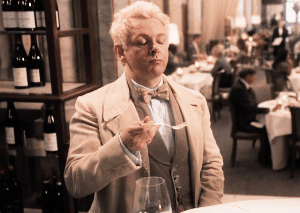
Phase 2 of Aziraphale and Crowley’s relationship began that day. Both of them recognized that they were the same - the only ones from both sides that only went along with their respective side as far as they could. This brought them even closer. They both risked so much to save a few children.
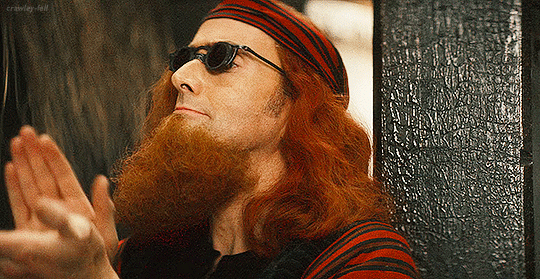
It was the first time post-fall that Crowley and Aziraphale worked together. This would continue, with some push and pull, until… well, forever.
This is also where trust begins to build in earnest, at least post-fall.
There’s also this:
God: Can you send lightening bolts and get them to report back to you?
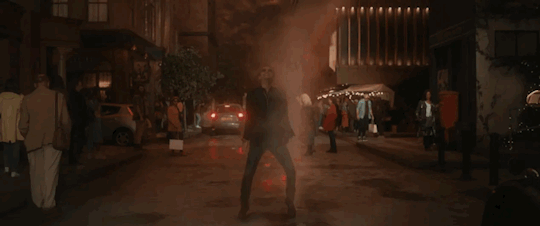
Has this been something Crowley’s always been able to do, or is he gaining skills to possibly get answers from God one day? (Why was I discarded?)
Which leads me to a weird question….

What if God had a bet with Satan about Crowley and Aziraphale?
Hear me out. Crowley has pre-fall memory lapses. He has been on Earth since the beginning, even though both God and Satan must know that he’s not doing the evil that one would expect from a demon. He rarely gets in trouble for any of his good deeds.
Aziraphale, likewise, has been on Earth since the beginning of. As with Crowley, Aziraphale rarely gets reprimanded by heaven, even though he’s “thwarting the will of God.”
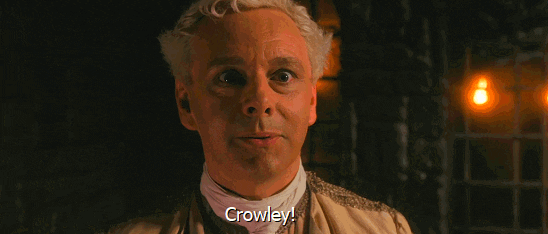
I’m thinking, because Crowley and Aziraphale had established some form of attachment (even if minor) that perhaps Crowley was sent to hell with the fallen angels, even if he didn’t necessarily “deserve “ it per God and Satan’s bet.
Would Crowley corrupt Aziraphale and make him fall? Would Aziraphale bring Crowley back to heaven?

And what if, because Aziraphale and Crowley are THEM, and they love each other for who they are, this game, or bet, failed.
Our ineffable duo instead created something no one anticipated. They became an US.
#good omens#crowley#aziraphale#ineffable husbands#aziracrow#some things do last forever#ineffable spouses#where have you been#you’re and angel who goes along with heaven as far as he can#it’s not so lonely anymore#good omens fan theory
204 notes
·
View notes
Text
All of you need to understand that when the Nightingales song played in Crowley’s car it wasn’t because he had planned it. It would have turned into a Queen song. No, it was WHAT AZIRAPHALE MADE THE CAR DO when he looked at the car before getting into the elevator. Via the song he says “I love you, I’m gonna figure this out, don’t lose hope.” Crowley doesn’t get it. He doesn’t get anything. But Aziraphale’s face in the elevator and the song indicates to me that he has an INEFFABLE EFFIN PLAN.
#crowley#good omens fandom#aziraphale x crowley#crowley x aziraphale#good omens 2#ineffable husbands#ineffable spouses#innefable husbands#crowley edits#ineffable divorce#good omens fan theory
402 notes
·
View notes
Text
Speculation on Archangel Michael
I think Crowley might have murdered Michael's boyfriend.

The way she rushes off so eagerly to make that phone call in the stairwell.
"It's me," she says with familiarity. Her voice is soft, and sweet, like her smile. "It's our man, Aziraphale. Is there any possibility he's working for you?"
She accepts his denial easily, without question. "No? Well then, you might want to investigate the activities of the demon Crowley. Might be playing his own game, word to the wise."
She's warning him. When he resists, she pushes back, but she is still gentle. "No, I'm - I'm telling you, you can't trust him."
He questions her, and there is a flirtatiousness in her voice. She almost purrs. "Of course you can trust me. I'm an angel."
Who is she talking to?
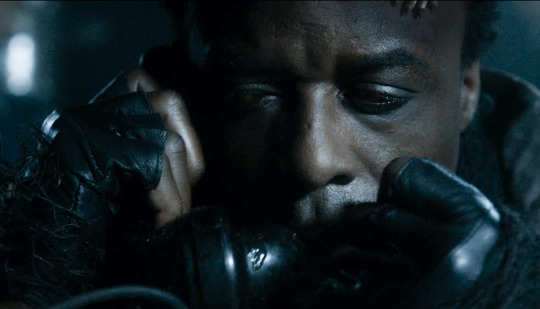
That's right. This guy. Ligur.
The one Crowley melts with holy water when Ligur comes for him.
Contrast this with the way Michael conducts her phone call to Hell in S2. (For what it's worth, I'm pretty sure she's talking to Dagon.)
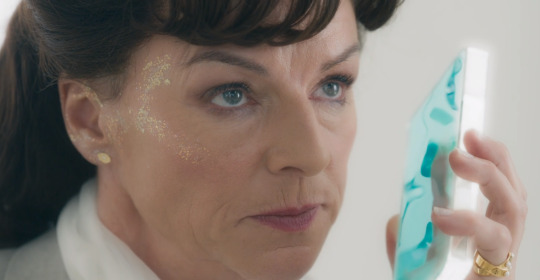
"I'm not saying Hell is complicit in this," she says, the facade of angelic grace barely concealing her irritation. She's lounging stiffly in her chair. She doesn't want to be on this call, explaining herself. "I'm not saying anyone is complicit. I'm just saying that if anyone is found helping him, we are prepared to use extreme sanctions."
"Extreme sanctions?" echoes the voice on the line.
"Yes," says Michael, almost rolling her eyes and restraining a sigh. "Book of Life."
"I'm on it," says the voice dutifully.
Michael's reply is almost a sneer. "I appreciate it," she says, and hangs up on the demon by literally blowing them off.
That is a pretty big tonal shift.
The softness she showed Ligur is not her usual way of going about things. She does not get her way by using a light touch. Irritated exasperation is closer to Michael's default.
She's calculating, and canny, and restrained. She sees through Aziraphale's deception in the Job job. She later investigates him by combing through Earth's surveillance when he makes some remarks that don't sit right with her. She cuts people off to talk over them. She's ambitious and covets Gabriel's job.
And yet, she was soft and sweet to Ligur, in a way we never see again.
And when it was time to execute Crowley, who showed up with a pitcher of holy water to destroy him?
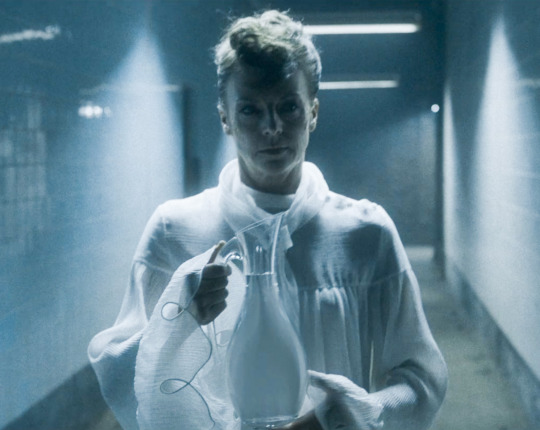
That's right. Michael.
Taking this scene at face value, I thought it was because Michael is one of Heaven's heavy-hitters, and she's the one with the backchannel to Hell. She's the one talking to them, so she's the one who goes there with the holy water.
But with S2 in mind, I'm seeing this with different eyes.
I think she requested this job. She knows Ligur was destroyed trying to bring in Crowley, and she has probably guessed where the demon's holy water came from. This execution was personal. She wanted to be the one to supply the water that melted the Serpent of Eden into a dingy pool of filth, just like he did to the demon she cared about. When she walks away with an empty pitcher, she looks satisfied.
That's it, that's the theory. Crowley murdered her boyfriend, Aziraphale supplied the murder weapon, and she probably hates both of them down to her angelic bones.
#good omens#good omens fan theory#good omens headcanons#crowley#aziraphale#archangel michael#good omens ligur#ineffable husbands#good omens fandom#good omens meta#good omens analysis
258 notes
·
View notes
Text
I THINK CROWLEY WAS A SERAPH?????
yes like the seraphim. like the highest order of heaven. like. the angels who have six wings and eyes all over them.
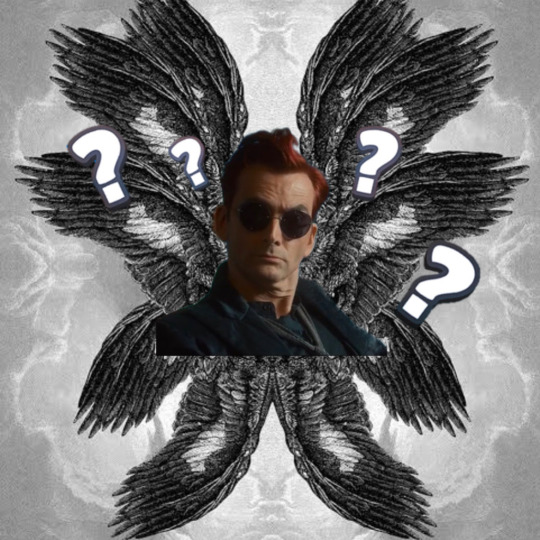
i understand that i probably need to provide evidence even though this is definitely just a headcanon currently. i'm very interested in mythology as a pagan, and i study demonic and angelic hierarchies in my spare time. so this is something i'm very interested in and i feel like i've cracked the case.
SO a couple things from the new season have been making me think that crowley was a rlly high ranking angel.
like we all knew that it was a little weird how he had the power to literally stop time in the first season. and then in this season, we see him literally manufacture star nurseries and nebulas. he's a lot more powerful than he lets on. as someone else described, he's incredibly powerful and being "just some guy" about it.
anyway we get some hints about what level of angel he's at. in the last episode, muriel tells him that only those ranked thrones or dominions or higher can access certain files in heaven. and crowley can.
now quickly, here are the ranks of the angels.

now, higher orders don't necessarily mean they are more powerful. in the context of good omens alone, gabriel is the supreme archangel and the most powerful. and even though principalities (like aziraphale) are ranked closer to god, they are less powerful than archangels.
so yeah crowley totally could have been an archangel, except they're ranked below thrones and dominions which means he couldn't have accessed the files. it doesn't even seem like saraqael could have accessed them, as she just watched even though she is an archangel. so i think crowley once upon a time was a higher rank than an archangel.
so that leaves four candidates. dominions, thrones, cherubim and seraphim. and thanks to a little line in episode 201, i think i've worked it out.
when beelzebub warns crowley about heaven's extreme sanctions, crowley tells them that (paraphrasing), "extreme sanctions aren't a thing. we just made them up to scare the cherubs."
THE CHERUBS. now, the plural of cherub is cherubim, and a cherub is often depicted as a baby angel, with similar iconography to cupid. so it makes sense that he's describing making up a story to scare the baby angels but it ALSO implies that the cherubim were ranked beneath him.
what's the only order of angels above cherubim? seraphim. va-voom.
and in case i need to further prove my case, do you know what the base word for seraphim is? it's the hebrew saraph, which means "burning" and sometimes is used as a noun to denote... "serpent."
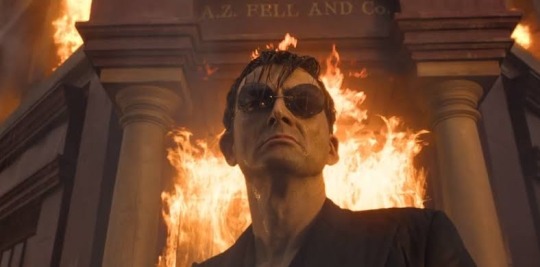
i've never really been into the fan theory that crowley was raphael before the fall. and now i don't think i do, mainly because im convinced he was one of the seraphim and raphael is always described as an archangel.
we might never know crowley's angel name, if it was different to his demon one. but i think the main takeaway is that he was a lot more powerful than first impressions might serve.
#good omens#crowley#ineffable husbands#good omens 2#go2#gos2#good omens season 2#good omens fan theory#fan theory#angelology#angels#david tennant#neil gaiman#good omens 2 spoilers#good omens spoilers#ineffable spouses#pre fall crowley
166 notes
·
View notes
Text
from one side I can see why people are so excited about S3 announcement, but from the other side do you think a person who did THIS:

could just not make a S3? He would be killed in his bed, or kidnapped like in Misery by Stephen King, let me tell you that
#S3 of good omens saved Neil gaimans life#Neil gaimans you are safe now#good omens aziraphale#good omens season two#ofmd season 2#good omens#good omens crowley#good omens fan theory#aziraphale#aziracrow#anthony j crowley#good omens 2#aziraphale x crowley#good omens s3#good omens season 3#go season 3#ineffable husbands
69 notes
·
View notes
Text
Here lies the former shell of Beelzebub

Another Good Omens 2 Theory
(Fair warning: I am operating on the personal opinion that all theories here could be extremely on the money or extremely not and their ‘correctness’ is in no way correlated to how fun they are to read/write. So this is NOT a 500 point essay of all the evidence, just an intriguing thought I felt others might enjoy also thinking about)
Also: spoilers
Right. Ok. Yes. So:
I hadn’t really read too much into the fact that Beelzebub got a “new face” for Season 2.
I had some mildly annoyed feelings that maybe the show wanted them to be more conventionally attractive now that they’ve got their own love story, but not much beyond that.
But…whilst scanning the intro for Clues…and pondering many a theory on Aziraphale defecting back to heaven…and how Gabriel serendipitously left a vacancy….
MAYBE:
Maybe this tombstone is a Clue?
Maybe this ties in with some Meddling going on (see Magic Trick You Didn’t See from @ariaste)?
Maybe Beelzebub DIDN’T just get a new face?
Maybe that isn’t actually the same Beelzebub from last season???
(Ok and maybe this epitaph is just an homage to the actor from season 1, but it’s more fun if it’s a Clue)
Hear me out?
Gabriel’s whole on-screen bond with Beelzebub happens AFTER the new face. We get some flashbacks from his POV of the years post-Apocalypsn’t, but the chain of custody on these memories is spotty AT BEST. Last time he seemed vaguely himself, heaven was already actively trying to mess with his memory. The Metatron was there.
For one prince of Heaven to be cast out makes a good story.
But if I wanted to really do some deep psychological manipulation of Aziraphale… then maybe this new story for Gabriel (showing Aziraphale that Angels really are good at their cores and/or when not in positions of power; that the Metatron might not frown on romance as much as we thought [although this is a ruse and we do need Crowley out of the picture])…well maybe this new love story (that conveniently mirrors something our Main Characters might just relate to)(but reads like maybe it was written by someone less invested than Neil Gaiman) makes quite an appealing narrative that someone might have reason to construct.
What if the “obvious” answer - that we just had to recast an actor and thought it’d be fun to add a fan fave ship - is actually just sleight of hand distracting us from a Big Fucking Clue?
(I have other thoughts about why Aziraphale is being re-recruited, but this post is just about this one Theory)
#good omens fan theory#good omens theory#ineffable bureaucracy#beelzebub#ineffible husbands#ineffable fandom#crowley#good omens#ineffible#good omens 2#good omens theories#metatron#aziraphale#magic trick we didn't see#meddling
100 notes
·
View notes
Text
When Aziraphale lists the times he did the "I was wrong" dance, the first date he gives is 1650. I had fallen down the rabbit hole of Strong's Concordance and looking up all the significant numbers I could think of in the show thanks to this post:
1650 seems to be kind of a random date, as we saw Crowley rescue Aziraphale in both 1793 and 1941. Looking up 1650 on biblehub.com, it corresponds to the Greek word "elegchos," meaning "a proof or test." And a tap on the "Topical" tab on biblehub.com shows that Archbishop James Ussher "proved" that the earth was created in 4004 BC in 1650. DID AZIRAPHALE HAVE SOMETHING TO DO WITH THAT? Is Aziraphale the reason Ussher got the timing wrong by nearly a quarter of an hour?? Did he let slip some major angelic intel that Crowley had to then help him resolve in some way?
#good omens meta#good omens fan theory#strong's concordance#strong's numbers#good omens#good omens 1650#james ussher#this was also incorrect#by almost a quarter of an hour#good omens 2#the “i was wrong” dance#apology dance#aziraphale#crowley#neil gaiman
40 notes
·
View notes
Text
The evidence stacks up
Oh my god. I just saw this yesterday. This.
THIS.
(Follow this for my fully fleshed out theory.)






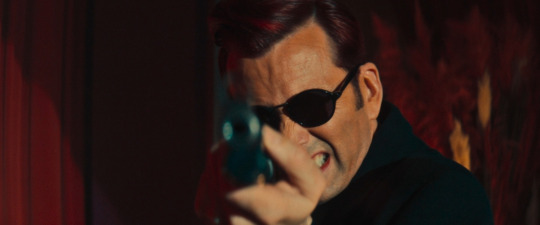
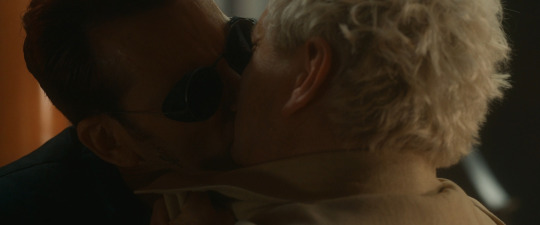
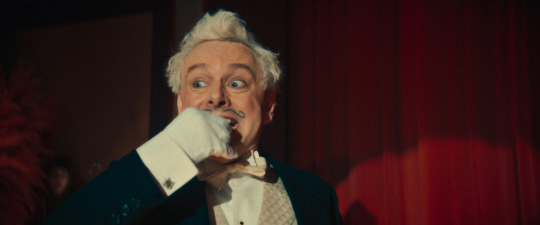
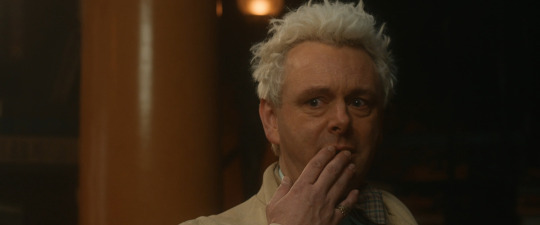
Yes. Yes. They showed us how it's going to go.
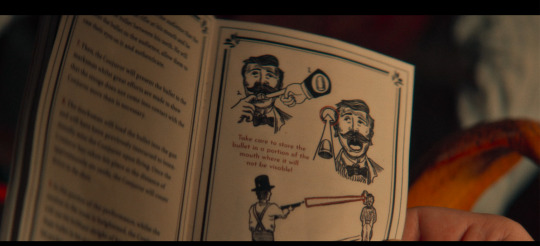
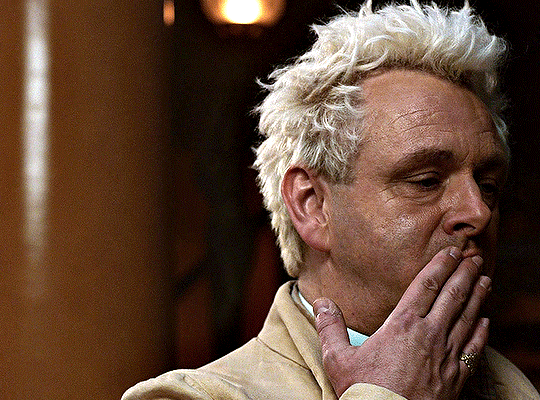
And watch him palm the bullet out of his mouth.
I rest my case.
#good omens#good omens 2#crowley#aziraphale#good omens meta#ineffable husbands#aziracrow#good omens analysis#good omens fan theory#final fifteen#good omens 1941#it's a trick#bullet catch
808 notes
·
View notes
Text
Thinking about what if the first Azirocrow meet was the same time God starts punishing rebellious angels?
I was wondering, why do Crowley absolutely unaware about consequences for questioning God, while Aziraphale is obviously much terrified.
Crowley was so excited about creation of Nebula. All in, he didn't pay attention to any news or any events happening around Heaven.
What if Aziraphale had just witnessed a banishment of an angel. What if it was someone Crowley used to hangout with and Aziraphale knows it? What had he felt when the angel, he possibly secretly admired, was digging his own grave right in front of Aziraphale?
And what if it was last time Crowley saw the stars? What if he was about to comeback to Heaven he couldn't recognise anymore? His friends was banished, God doesn't answer anymore and all his work was pointless, because the universe is about to be shut down again.
What if their first meet was the day he lost everything?
22 notes
·
View notes
Text
Losing Aziraphale
During the bookshop fire, Crowley believed Aziraphale had been killed. Aziraphale wasn’t there, wasn’t FELT. Crowley expresses so much grief at the thought of losing his best friend, the love of his existence.


As he drives away, his eyes still uncovered, there is so much emotion.

At the same time, Aziraphale is in heaven, being reprimanded for losing the flaming sword AND his body.
At this point, Aziraphale chooses Crowley and rejects heaven. He CHOOSES to go back to Earth, to save humanity, to be with Crowley. All of the previous hesitations are gone.
AND he breaks with the angels vs demons teachings when he chooses to possess a human in order to save humanity. (Or several, in the book)
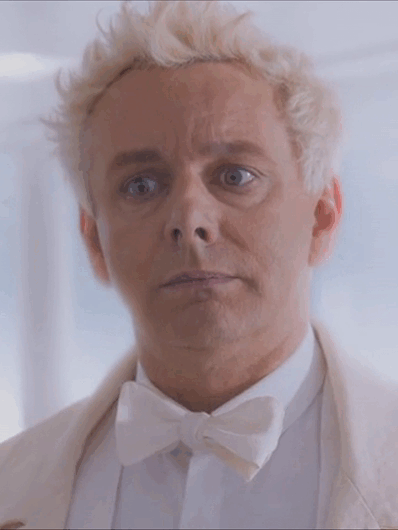
After averting the apocalypse, Aziraphale goes all in. He’s with Crowley, 100%. They trick heaven and hell by choosing their faces wisely. They have “their” car and “their” bookshop. They start wanting to define their relationship in human terms. BOTH of them.
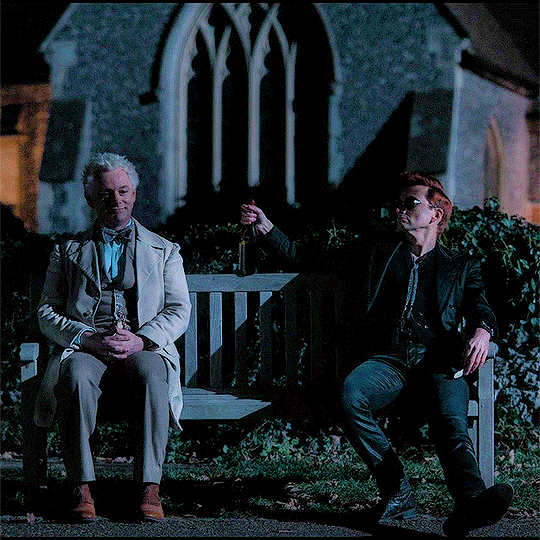
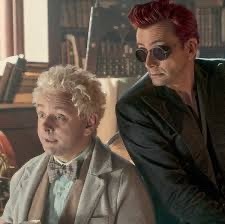
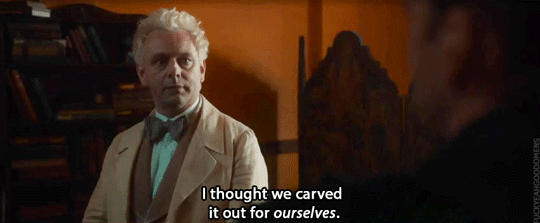
Aziraphale didn’t choose heaven over Crowley, or over humanity.
Those ties were broken when he chose not to fight, chose to return to save humanity, chose Crowley.
Aziraphale had stopped pretending, stopped saying they’re on different sides, stopped making comments on angels vs demons.
That’s what threw up red flags during the final conversation between Aziraphale and Crowley.
‘Of course you said no to hell. You’re the bad guys.’
And, in reference to the peaceful, fragile existence they had carved out for themselves:
‘Oh Crowley, nothing lasts forever.’
Aziraphale returned to heaven because he had no choice.
And deep down, Crowley knows it too. That’s why this, the second drive he’s taken past the bookshop after losing Aziraphale, looks so different.
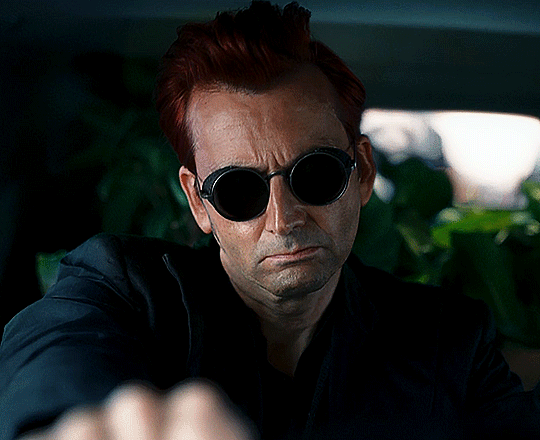
#good omens#crowley#aziraphale#ineffable husbands#good omens fan theory#aziraphale chose crowley a long time ago#heaven is going to regret what they’ve done#at least the leadership that forced aziraphale’s return#let these two be an us
86 notes
·
View notes
Text
GOOD OMENS: GUYS, I FOUND SOMETHING IN THE INTRO
WHAT IS THIS
It looks like they’re holding or leaning against each other and like Crowley’s arm is kinda moving? Sorry for the bad footage, but go watch it yourself! It’s a whole thing!

Oh and this Rasputin looking guy? It’s Crowley, with long beard and a white angelic robe. He has never looked like that in the show. And they’re walking towards Heaven, he’s in the CENTER of the screen in one sequence, far behind “regular” Aziraphale and Crowley walking in front of him.
I think Rasputin Crowley is important somehow.
Ra-Ra-Rasputin, Heaven’s greatest star machine. He had to fall ‘cause he wondered “why”!
#crowley#good omens fandom#aziraphale x crowley#crowley x aziraphale#good omens 2#ineffable husbands#ineffable spouses#innefable husbands#crowley edits#ineffable divorce#good omens intro#good omens season 3#good omens fan theory
91 notes
·
View notes
Text
Another Bentley Thing
I know we're supposed to be looking for not-Bentley clues, but I noticed another thing about the Bentley while poking around, so I thought I'd share it.
We see the speedometer of the Bentley just a few times during the season. First, when Crowley is racing through London while "Good Old-Fashioned Lover Boy" is playing. It's only on screen for a moment, but I managed to grab a pic. Even blurry, we can make out the odometer at the top, reading 66666.

Of course it's all 6s. Demon car, right?
Then Aziraphale drives to Edinburgh.

That's definitely not all 6s anymore. Looks to me like it says 63332. Has the number of miles gone backwards? Could also be 68332, but in that case, where did all those extra miles come from? Crowley's always only 2 minutes away from the bookshop, and it's only 400ish miles to Edinburgh. Either way, it's weird.
We see it one more time when the Bentley speeds up after Crowley threatens to sell books.

The final 2 has ticked over to a 3. The odometer is actually tracking miles here, which it probably doesn't do when Crowley drives.
What does all this mean? Well, there's weirdness going on, like we already knew. I can't wait to learn all the secrets behind all the details we keep finding. But for now, keep on digging. I love to see what you all come up with!
#good omens 2#go2#good omens#good omens speculation#good omens meta#bentley#the bentley#good omens season 2#good omens fan theory
49 notes
·
View notes